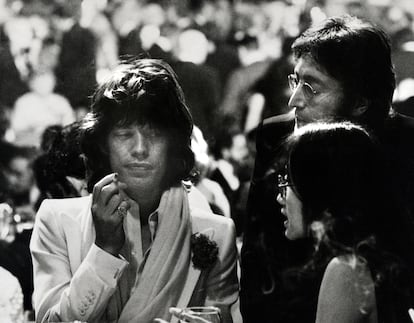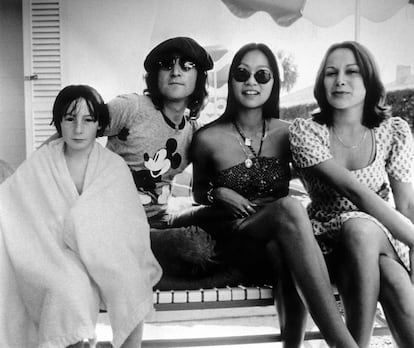May Pang, the girlfriend Yoko Ono chose for John Lennon
A new documentary featuring the couple’s former assistant recounts the romantic relationship that the Japanese artist arranged for her husband. Despite the fact that he referred to their romance as a ‘lost weekend,’ it lasted for 18 months, and they remained friends until his murder

One summer day in 1973, Yoko Ono walked into the office of 22-year-old May Pang, Ono and John Lennon’s personal assistant. Upon entering, Ono said, “May, I need to talk to you. John and I are not getting along very well right now. He’s going to start dating other people. I know you’re single, and I know that you’re not [pursuing] John, but you need a boyfriend and I think you’d be good for him.” Pang grew up in Harlem and was the daughter of Chinese immigrants who owned a laundry. At just 19 years old, she started working at Apple Records, a record label founded in 1968 as a division of Apple Corps, the conglomerate that combined the Beatles’ personal and artistic interests. Shortly thereafter, she began to dedicate her work exclusively to the couple; she was essentially on call for them 24 hours a day: “A normal day consisted of making them coffee, opening the mail and phoning Andy Warhol or Jackie Onassis. Every day was a surprise,” she revealed in an interview. Pang was stunned at Ono’s proposal: “Are you kidding? I can’t do that, he’s my employer, he’s my boss. He’s your husband.”
Now May Pang, 72, is taking the spotlight in a forthcoming documentary titled The Lost Weekend, an allusion to the name John Lennon gave his 18-month-long affair. The name refers to Billy Wilder’s 1945 film, which tells the story of an alcoholic writer whose addiction causes him to harm everyone around him. In the documentary, she tells her version of what happened, including Yoko Ono’s role in Pang’s first love story: “I was 23 years old, and my first boyfriend was John Lennon,” she says.
John Lennon and Yoko Ono had married four years earlier, on March 20, 1969, in Gibraltar. A year later, in 1970, the Beatles broke up, and the band’s fans quickly blamed Yoko Ono for that decision. The backlash from the press and fans was brutal, especially toward her; as a woman and, even worse, a foreigner, Yoko seemed to represent various evils. The truth is that Yoko was never the cause of The Beatles’ breakup, but just another aspect of the wear and tear of the world’s most famous music group. Lennon was more tired of being a Beatle than any other band member, and looking for a way out; he found one in Yoko Ono. The two built a new partnership that combined romance and artistic creation, and the couple positioned themselves at the forefront of that period’s creative activities. In 1971, John and Yoko left London to start a new life in New York.
Four years after their wedding, their relationship was going through a rough patch. The couple had just moved into Manhattan’s iconic Dakota Building, where John Lennon would be murdered seven years later. The crisis in their relationship was also an artistic and creative crisis. Yoko Ono was perfectly aware of what was happening, as she revealed in an interview with The Telegraph in 2012: “We were ruining our careers. People hated me, and they hated John because of me.”

Lennon’s insecurities as an ex-Beatle embarking on a solo career translated into greater alcohol consumption, and he became increasingly jealous, obsessed and manipulative with Ono. Lennon followed her into the bathroom, so they wouldn’t be apart. He needed her constant presence, even in the recording studio with the Beatles, which was one reason the band split up. Ono alone was blamed for the dissolution of the band and branded an interloper. Lennon was also unfaithful to Ono on a number of occasions, including one infidelity at a party that his wife was attending.
Yoko Ono needed some time away from John Lennon and came up with the perfect strategy: find another woman to take care of him. “I thought it was better to give him a rest. And I needed a break. May Pang was a very intelligent, attractive and extremely efficient woman. I thought she would be a good choice,” she revealed in an interview with The Telegraph. At the time, she wrote a song dedicated to Lennon titled “I Want My Love to Rest Tonight.”
The Lost Weekend

“I didn’t know where it was going to lead,” May Pang acknowledged in an interview in this week’s issue of People magazine. “I was like, ‘What’s going to happen?’ I was very content in working. [But] he kept saying, ‘I don’t know where this is going to lead, but let’s just do the jump.’” And so they did. Despite her initial reluctance, they started a love affair that lasted 18 months, from 1973 until 1975, when John Lennon and Yoko Ono got back together.
May Pang was not merely Lennon’s lover; she was a full-fledged girlfriend. For a time, they even lived together, dividing their time between New York and Los Angeles. In California, they lived in a huge mansion where, according to legend, John F. Kennedy and Marilyn Monroe used to meet. Together they attended numerous parties with friends, including Ringo Starr — who, Pang confesses, had been her favorite Beatle since she was a teenager because she loved his blue eyes — Elton John, Harry Nilsson and Mick Jagger. John “was just an interesting person. He really loved everything, and wanted to explore,” Pang says. “He loved to get up, have his coffee in the morning. He loved blueberry pancakes, he loved swimming. He was just an awesome person who wanted to discover things.” The two also shared a passion for music— ”it was what he loved most — and even spent time jamming with former Beatles bandmates Paul McCartney and George Harrison. “George once said, ‘I’m so happy you’re with John,’ and that was a nice thing of him to say to me,” she remembers.
During all that time, Pang documented everything with her camera, the results of which ended up in her 2008 book, Instamatic Karma. She also helped John recover his lost relationship with his son Julian, his child from his first marriage to Cynthia Powell. Her book includes photos of the couple with the boy at Disneyland. Powell later acknowledged how grateful she was to Pang for bringing about the reunion between father and son.
However, all that glittered was not gold. At the beginning of 1974, Lennon was practically drunk all the time, and his parties with musician Harry Nilsson constantly made the front page of the newspapers. According to his biographers, that was a dark period in the musician’s life, during which he was plagued by depression and had to sign the last papers linking him to the Beatles. And Yoko Ono was always present. She called him frequently, sometimes more than 15 times a day. In 1974, Yoko Ono asked him for a divorce, and John Lennon agreed to it. But that never happened. Pang recounts in the People interview that she believes the artist’s eagerness to end his second marriage took Ono by surprise and catalyzed her desire to end John and May’s relationship and win her husband back. Lennon was trying to quit smoking, and Ono told him she knew a hypnotist. Pang claims that she “knew” things were over when Lennon saw Ono again. “You just know,” she asserts. “He was not the same when I saw him [again].”
The relationship ended much like it began. “Yoko didn’t realize that our [relationship] was going to turn into a love story. She thought it would be a two-week thing,” Pang explains in the documentary. One fine day, she got a call from Ono, who told her: “I’m thinking of getting back together with John.” Dumbfounded once again, Pang asked, “What?” Yoko Ono replied, “I think it’s time.”
Pang says she had no sense of closure, just as she had no power in the beginning of her relationship with John. For years, they continued to see each other: “He’d secretly come over to see me. He would say, ‘You know, I still love you,’” she recalls. “He said things to me that were really very intimate and you could sense there was something still. It was gnawing at him. It was not a finished situation.” They were friends until December 8, 1980, the day he died.
Sign up for our weekly newsletter to get more English-language news coverage from EL PAÍS USA Edition
Tu suscripción se está usando en otro dispositivo
¿Quieres añadir otro usuario a tu suscripción?
Si continúas leyendo en este dispositivo, no se podrá leer en el otro.
FlechaTu suscripción se está usando en otro dispositivo y solo puedes acceder a EL PAÍS desde un dispositivo a la vez.
Si quieres compartir tu cuenta, cambia tu suscripción a la modalidad Premium, así podrás añadir otro usuario. Cada uno accederá con su propia cuenta de email, lo que os permitirá personalizar vuestra experiencia en EL PAÍS.
¿Tienes una suscripción de empresa? Accede aquí para contratar más cuentas.
En el caso de no saber quién está usando tu cuenta, te recomendamos cambiar tu contraseña aquí.
Si decides continuar compartiendo tu cuenta, este mensaje se mostrará en tu dispositivo y en el de la otra persona que está usando tu cuenta de forma indefinida, afectando a tu experiencia de lectura. Puedes consultar aquí los términos y condiciones de la suscripción digital.









































